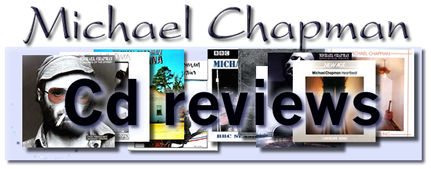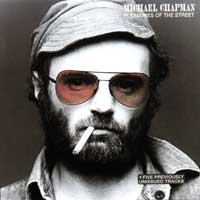|
|
|
|
|
|
|
PLEASURES
OF THE STREET (Mooncrest CRESTCD. 047)
Pleasures takes us back to the live album of that name culled from two
evenings of concerts in Hamburg in August 1975, and is a reissue of that
album together with five extra cuts from the same sets (three of which
duplicate songs featured earlier in alternate performances). This is definitive
mid-70s Chapman, here featured first in solo acoustic mode then from track
five onwards with a band (Keef Hartley, Steffi Stephen and Achim Reichel),
arguably at the zenith of the soulful-rockin' phase of his career.
David Kidman
(published in Traditional Music Maker, Feb 2001)
|
|
|
|
|
|
|
|
|
|
|
|
DANGEROUS
WHEN SOBER (Sanctuary CMDDD 993)
Our Rating 
 
 
 
 

Although
he's creatively active to these days and has quietly enjoyed a decent
size cult following for over 35 years now, Leeds-born, Hull-based MICHAEL
CHAPMAN has had a frustrating relationship with fatal fame. He's a hardened
troubadour who's often been seen as too folky for the rock crowd, while
the rock crowd have stayed away from him en masse because of his folk
roots. Even worse, he made superb albums like "Rainmaker" and "Fully Qualified
Survivor" ( one of John Peel's favourite albums) as the Sixties collided
with the Seventies, but all too often these days those records are viewed
as important purely because David Bowie heard Mick Ronson weaving his
six-string spells all over them, rather than because of Chapman's songs
per se.
So, while much of Chapman's career is still available, it's about time
a younger public were introduced to this bluff, grizzled Northern geezer
who deserves to be mentioned in the same breath as the likes of John Martyn
and Nick Drake and has gone on to embrace electric rock and a host of
stylistic deviations since those heady 1960s troubadour days.
Enter Castle Music's magnificent new double CD anthology "Dangerous When
Sober": a typically self-deprecatorily-titled collection featuring over
2 and a half hours of music, much of which is utterly breathtaking and
makes abundantly clear how adroitly Chapman moved forward during his halcyon
years 1966 - 1980.
CD1 plots a course through Chapman's years as an acoustic troubadour,
playing every cellar, folk club and dungeon that would have him. Brilliantly,
it opens with a quartet of tunes recorded at Chapman's very first solo
acoustic demo at Fairview Studios in Hull during 1966. Featured are gritty,
uncompromising takes of Big Bill Broonzy's "Key To The Highway" and the
sparser, humbucking version of the trad "Easy Rider", not to mention a
spellbinding run through Mose Allison's classic murder ballad "Parchman
Farm". This is a tune Nick Drake would also take under his wing, but it's
Chapman's melancholy delivery that really suits the penitential subject
matter ("I'm on this farm for the rest of my life and all I did was shoot
my wife") and to hear these tunes is to uncover a valuable heirloom from
the British blues boom era.
Aftre these songs were laid down, Chapman began to come to public attention
playing the Cornish folk circuit during 1967's Summer Of Love, and the
remainder of CD1 is culled from Chapman's live solo/ duo club sets (with
Rick Kemp) which were his bread and butter during his early career in
the late 1960s/ early 1970s. Starting with Chapman's version of Otis Rush's
"Rockport Sunday", these tracks are a lengthy and fascinating trawl through
Michael's ever-changing moods and highlight his skilful guitar picking
style, melancholic lyrical style and sozzled vocal delivery. Like John
Martyn and Richard Thompson, Chapman's voice can initially be an acquired
taste, but one that becomes addictive after a while.
Highlights abound. Try the venom with a spiritualistic twist he injects
into "Not So Much A Garden (More Like A Maze)" with its' sitar-like tunings
and brief snatch of "Norwegian Wood" or the deceptively pretty "It Didn't
Work Out". Then there's "Wrecked Again":perhaps the very essence of Chapman
and introduced here in a typically self-deprecating fashion by our man
as "my autobiography in two words." That description cloaks a tangibly
honest self-portrait with the enduring "I've been falling so long I've
forgotten how to stand" chorus.
CD2 flings us forward
to the mid-70s. It opens with a killer triumvirate of solo acoustic numbers
from Chapman's fruitful Deram Records period (of which a wired "In The
Valley" probably shades top marks), but mostly concentrates on Chapman's
more rock-oriented material.
The first half of these songs were recorded live in '75 at a sweaty Hamburg
club with a band including skinsman-about-town Keef Hartley. Chapman recalls
in the sleevenotes that the songs were recorded in uncomfortable conditions
with instruments going out of tune and unforgiving promoters overselling
tickets. No matter: the end results are excellent, with Chapman and co
kicking up a tense, but slack bluesy rock sound with nods to the Stones
and early, listenable Dire Straits. Chapman's everyman persona and gritty
delivery is ideal for bitten-off rockers like "Sea Of Wine" and "Shuffleboat
River Farewell", while an amped-up "Wrecked Again" is livid and vital.
The anthology continues with a further brace of live recordings from 1976,
as keyboards enter the equation, the band get loucher and funkier than
ever on "Time Enough To Spare" and Chapman revisits his blues roots on
the laid-back, Dylan-ish "Devastastion Hotel" . To conclude, we come full
circle with Chapman back at Fairview making electric demos in 1980. He
embraces rugged rock on "Running For Cover" and even reggae on "Lonely
By The Mile" and the closing title track. This sounds unlikely, but Chapman
pulls it off with his usual dry aplomb, tailoring the skanky lope to his
own ends and once again looking to both the present and the future.
There are a few blndspots. "Thank You P.K 1944" may well be a heartfelt
tribute to the painter Paul Klee, but its' heaviosity is laboured, while
- even allowing for Chapman's dexterity - "A Scholarly Man" is too much
to take at a gargantuan 15 minutes. Like the Velvets' "Sister Ray", this
one sent your reviewer into the kitchen to do that long-overdue washing
up.
The uninitiated may also be disappointed to discover there's nothing here
that features Mick Ronson, but all credit to Castle Music as Michael Chapman
deserves to step out of that particular shadow at long last.
Besides, surrounded by this generous quality, quibbling about a few blemishes
is like discovering Aladdin's cave and moaning that it's lit by a 100
watt bulb instead of a chandelier. Instead, simply dive in and marvel
at this veritable cache of jewels.
Tim Peacock
whisperingandhollerin September 2004
reproduced with permission |
|
|
|

